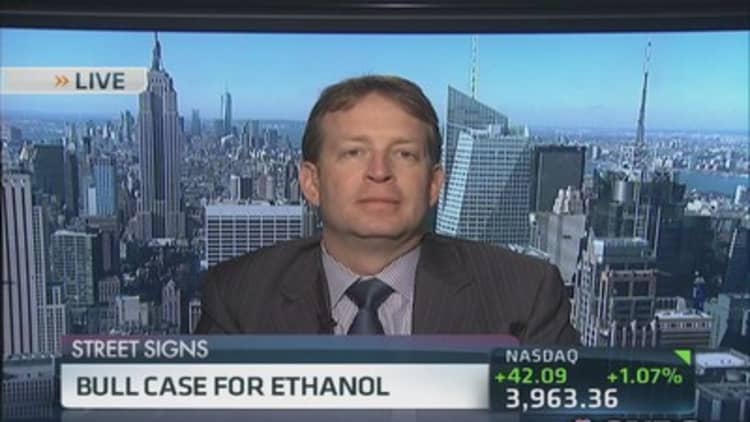Ethanol requirements for U.S. gasoline appear to be losing friends and influencing the wrong people, with calls growing to reform or scrap the government mandates altogether.
The Environmental Protection Agency in November proposed reducing the amount of renewable fuels, including corn-based ethanol, that oil refiners must blend with gasoline. The rule is a centerpiece of government efforts to curb carbon emissions, while jump-starting alternative forms of energy.
The draft rule would impact the 2014 requirement for renewables to fall between 15 billion and 15.52 billion gallons from 18.15 billion gallons. But the proposal to reduce ethanol requirements for 2014 has done little to quell the groundswell of complaints about the practical effects of using corn-based fuel in America's gasoline supply.
Earlier this month, California Democrat Dianne Feinstein joined forces with Oklahoma Republican Tom Coburn to introduce a Senate bill to strip ethanol completely from the Renewable Fuel Standard, also known as RFS. Although Feinstein continues to champion renewable fuel, she has expressed concerns that excess corn-based fuel production—mainly due to the RFS requirements—is "really not wise," and that the standards may hurt the Golden State's livestock producers.
The bipartisan nature of that bill, combined with the EPA's proposal, sent corn futures reeling on the Chicago Board of Trade in early December.
(Read more: )
Not surprisingly, biofuel advocates have had much to say about this potential shift—almost none of it positive..
"This bill from Senators Feinstein, Coburn, and their co-sponsors is short-sighted and demonstrates a failure to understand how the renewable fuel industry works," said Fuels America, an advocacy group that supports the Renewable Fuel Standard, in a statement.
"This measure would strand billions of dollars already invested in advanced fuels; undermine research and development; and threaten thousands of potential jobs," the group said. The Senate measure, if passed, would "kill the promise" of biofuels, Fuels America said in the statement.
Ethanol lies at the heart of a tangled nexus of special interests, pitting farmers against energy producers. Although biofuel mandates have enjoyed wide backing in Washington since they first were introduced in 2007, the complicated and expensive mechanics of enforcing the Renewable Fuel Standard have emboldened opponents, who want to kill the ethanol requirements.
In the absence of more advanced biofuels, which have failed to take off as promised, farmers have churned out corn-based fuel sources in anticipation federal mandates would create a captive market. In October, ethanol production surged to the highest level in more than 16 months, amid record corn crops and lower gasoline demand overall.
The biofuel industry is poised to churn out more than 13.4 billion gallons of corn-based ethanol in 2013, helped by a record amount of U.S. corn crop production in 2013, according to Bloomberg New Energy Finance, an energy think-tank.
Against the backdrop of rising ethanol stocks and falling gasoline demand, the EPA proposed a lower biofuel quota for 2014. It was a small victory for the petroleum industry, but a far cry from resolving what some analysts say is a fundamental problem with the renewable requirement.
They contend there's simply too much renewable fuel amid insufficient demand. The Energy Information Administration's most recent short-term energy outlook projects that in 2013-2014, motor fuel consumption will be flat to marginally higher.
(Read more: Ethanol mandate, 'blend wall' loom large for refiners)

"Thanks to the RFS and the renewable fuel mandate in it, we use about 2.5 times more ethanol than needed in the U.S.," said Alejandro Zamorano, an analyst with Bloomberg New Energy Finance.
Playing out in the background are the high costs of fuel-mandate compliance to refiners. The market price for Renewable Identification Numbers (RINs), the credits refiners use to meet their biofuel quotas, are only just starting to come down from a record high set earlier this year.
Elevated RIN prices, oil and gas producers say, force refiners to pass the costs along to consumers in the form of higher prices at the pump.
"The EPA can adjust standards down ... but long term we need Congress to provide a permanent fix," said Bob Greco, downstream group director at the American Petroleum Institute, which has called for a full repeal of RFS.
Calling concern over ethanol standards "bipartisan," API's Greco added that "it's not the oil industry versus ethanol industry. There's a growing chorus of diverse groups that want to affect change."
Those groups include AAA—the motorist group that calls RFS targets "unreachable," even as it voices support for alternative energy sources. Meanwhile, advocacy group Smarter Fuel Future has issued a call on its website for Washington to "revisit the failed RFS and enact policies" that take into account the concerns repeatedly associated with clean energy mandates.
The EPA's 60-day period for public comment closes in mid-January next year, when the EPA is likely to announce next steps on any potential changes to ethanol guidelines.
—By CNBC's Javier E. David. Follow him on Twitter @TeflonGeek


